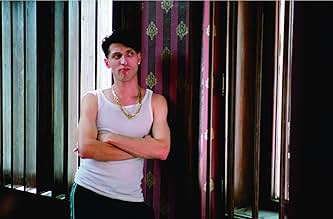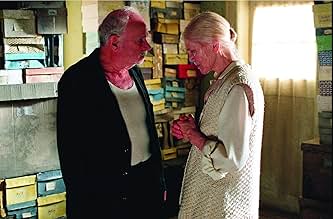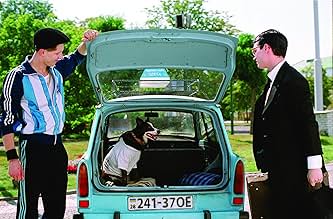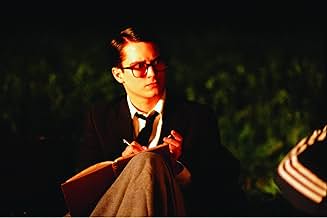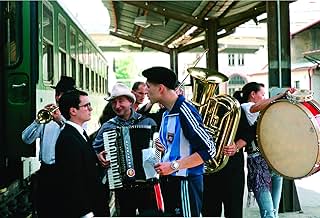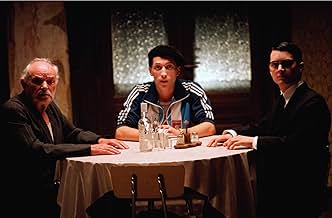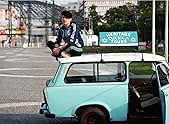A young Jewish American man, with the help of an eccentric local, endeavors to find the woman who saved his grandfather during World War II in a Ukrainian village that was ultimately razed b... Read allA young Jewish American man, with the help of an eccentric local, endeavors to find the woman who saved his grandfather during World War II in a Ukrainian village that was ultimately razed by the Nazis.A young Jewish American man, with the help of an eccentric local, endeavors to find the woman who saved his grandfather during World War II in a Ukrainian village that was ultimately razed by the Nazis.
- Awards
- 7 wins & 6 nominations
- Grandfather
- (as Boris Leskin)
- Ukrainian Band Member
- (as Sergej Rjabcev)
- Ukrainian Band Member
- (as Jurij Lemeshev)
- Director
- Writers
- All cast & crew
- Production, box office & more at IMDbPro
Storyline
Did you know
- TriviaEugene Hutz's band Gogol Bordello appears as the polka band that greets Elijah Wood at the train station.
- GoofsWhen the Grandfather repeatedly sounds the horn of the car, he presses the middle of the steering wheel to do so. In the Trabant, the horn is activated by pushing the signal light lever forward.
- Quotes
Alex: I have reflected many times upon our rigid search. It has shown me that everything is illuminated in the light of the past. It is always along the side of us, on the inside, looking out. Like you say, inside out. Jonathan, in this way, I will always be along the side of your life. And you will always be along the side of mine.
- Crazy creditsSeveral songs are credited to the New York punk/Gypsy/Jewish klezmer band, Gogol Bordello, which is led by Eugene Hutz, who plays Alex in the film (the same band greets Jonathan when he arrives on the train). The last of these songs, "Start Wearing Purple (For Me Now)," which plays over the end credits, is credited to both a correct spelling (Gogol Bordello), dg and Gogol Bodello, an incorrect spelling.
- ConnectionsReferenced in Operation Filmmaker (2007)
Debut director/adapter Liev Schreiber retains some of the humor and language clashes of the novel, mostly through the marvelous Eugene Hutz as the U.S.-beguiled Ukrainian tour guide. He is so eye-catching that the film becomes more his odyssey into his country and his family as he goes from his comfortable milieu in sophisticated Odessa to the heart of a cynical, isolated land that has been ravaged by conquerors through the Communists and now capitalists, with both Jews and non-Jews as detritus. As funny as his opening scenes are when he establishes his cheeky bravura, we later feel his fish-out-of-waterness in his own country when he tries to ask directions of local yokels.
Shreiber uses Elijah Wood, as the American tourist, as an up tight cog in a visual panoply, as his character is less verbal than as one of the narrators in the book. He and Hutz play off each other well until the conclusion that becomes more sentimental in this streamlined plot. Once the grandfather's story takes over in the last quarter of the film, marvelously and unpredictably enacted by Boris Leskin, the younger generation does not seem to undergo any catharsis, as they just tidy up the closure.
Schreiber does a wonderful job visualizing the human urge to document history. One of his consultants in the credits is Professor Yaffa Eliach and her style of remembering pre-Holocaust shtetl life through artifacts clearly inspired the look and it is very powerful and effective.
The Czech Republic stands in for the Ukraine and the production design staff were able to find memorable symbols of change in the cities, towns and countryside, as this is now primarily a road movie, and the long driving scenes do drag a bit. Schreiber retains some of the symbolism from the book, particularly of the moon and river, but having cut out the portions of the book that explain those, they just look pretty or ominous for atmosphere and no longer represent time and fate.
As W.C. Fields would have predicted, the dog steals most of his scenes for easy laughs. In general, Schreiber does go for more poignancy than the book. It is irresistibly touching, especially for those who haven't read the book, but less morally and emotionally messy.
The film is enormously uplifted by its marvelous soundtrack, which ranges from songs and instrumentals from Hutz's gypsy band to traditional tunes to contemporary tracks to Paul Cantelon's klezmer fusion score.
This is not a Holocaust film per se, being a kind of mirror image of "The Train of Life (Train de vie)" as about memory of a time that is freighted with meaning now, but will resonate more with those who have an emotional connection to that history.
Details
- Release date
- Country of origin
- Official site
- Languages
- Also known as
- The Collector
- Filming locations
- Production companies
- See more company credits at IMDbPro
Box office
- Budget
- $7,000,000 (estimated)
- Gross US & Canada
- $1,712,337
- Opening weekend US & Canada
- $66,806
- Sep 18, 2005
- Gross worldwide
- $3,601,974
- Runtime1 hour 46 minutes
- Color
- Sound mix
- Aspect ratio
- 1.85 : 1
Contribute to this page



